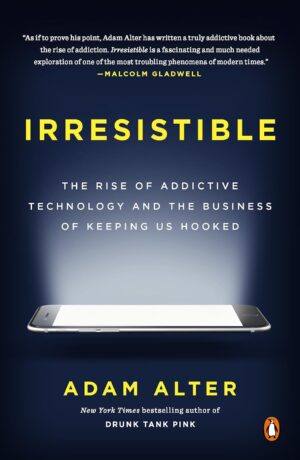Favorite quote:
When you approach life as a sequence of milestones to be achieved, you exist “in a state of near-continuous failure.” Almost all the time, by definition, you’re not at the place you’ve defined as embodying accomplishment or success. And should you get there, you’ll find you’ve lost the very thing that gave you a sense of purpose—so you’ll formulate a new goal and start again.
Book Description:
Welcome to the age of behavioral addiction—an age in which half of the American population is addicted to at least one behavior. We obsess over our emails, Instagram likes, and Facebook feeds; we binge on TV episodes and YouTube videos; we work longer hours each year; and we spend an average of three hours each day using our smartphones. Half of us would rather suffer a broken bone than a broken phone, and Millennial kids spend so much time in front of screens that they struggle to interact with real, live humans.
In this revolutionary book, Adam Alter, a professor of psychology and marketing at NYU, tracks the rise of behavioral addiction, and explains why so many of today’s products are irresistible. Though these miraculous products melt the miles that separate people across the globe, their extraordinary and sometimes damaging magnetism is no accident. The companies that design these products tweak them over time until they become almost impossible to resist.
By reverse engineering behavioral addiction, Alter explains how we can harness addictive products for the good—to improve how we communicate with each other, spend and save our money, and set boundaries between work and play—and how we can mitigate their most damaging effects on our well-being, and the health and happiness of our children.
Alter, Adam. Irresistible: The Rise of Addictive Technology and the Business of Keeping Us Hooked. Penguin Books, 2017.
Addictions, obsessions, and compulsions are behaviors with damaging consequences, and unfortunately for most of us, modern capitalism is designed to encourage us to pursue those behaviors. I personally long ago lost count of the number of times I’ve found myself playing solitaire even as I wondered WHY I was wasting my time with a game that is just a waste of time and energy. Irresistible thoroughly answers that question for me, with science around variable reinforcement, dopamine, anticipation, addiction and so much more.
You have so much to lose, and your aversion to that sense of loss compels you to feed the machine just one more time, over and over again. You start playing because you want to have fun, but you continue playing because you want to avoid feeling unhappy.
Irresistible is an interesting, thoughtful look at what drives us to do things that we know are bad for us, followed by advice on how to stop. The advice avoids the obvious stuff that doesn’t work (ie, just say no!) and looks at the stuff that mostly does, such as designing a temptation free environment (it’s tough to play solitaire if you’ve deleted it from your computer) and learning how to blunt temptation. My favorite takeaway is that the language we use either empowers or disempowers us, and when we take ownership of our choices, we’re more likely to choose wisely. For example,
you can either tell yourself “I can’t use Facebook,” or you can tell yourself “I don’t use Facebook.” They sound similar, and the difference may seem trivial, but it isn’t. “I can’t” wrests control from you and gives it to an unnamed outside agent. It’s disempowering. You’re the child in an invisible relationship, forced not to do something you’d like to do, and, like children, many people are drawn to whatever they’re not allowed to do. In contrast, “I don’t” is an empowering declaration that this isn’t something you do. It gives the power to you and signals that you’re a particular kind of person—the kind of person who, on principle, doesn’t use Facebook.
In one study, 10 percent of participants continued with their goal when they used the words, “I can’t” while a full 80 percent continued when they used the words, “I don’t.” How we talk to ourselves matters.
Irresistible is also a really good read. Daniel Pink, author of Drive, called it “smart, sharply-argued,” and Charles Duhigg, author of The Power of Habit, said it was “important, insightful, and a pleasure to read.” Recommended.

